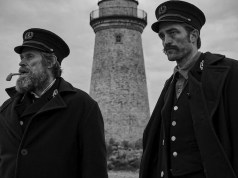It is gratifying to discover that, in the year 2012, after a century of movies and many centuries of human culture, mankind is still capable of finding new ways of being weird. Leos Carax’s “Holy Motors” is not just a gloriously unusual film, it’s unusual in ways that I haven’t seen before, combining metaphor, symbolism, and sheer looniness to convey a profound affection for cinema itself.
On the surface, the story is this. Over the course of a day, a man named Oscar (played by the stunningly chameleonic Denis Lavant) is driven to a series of “appointments,” each requiring him to portray — to be, really — a different person. At one he is an old beggar woman; at another he does motion-capture work for a special-effects-oriented film; at another he is a troll who lives in a cemetery. Never less than 100 percent committed to the task at hand, he uses the time between appointments to change costumes and apply makeup in the backseat of his fully stocked limousine. Whatever this weird line of work is, Oscar is the consummate professional at it.
Nothing about it makes any literal sense. Oscar has a boss (Michael Piccoli), and his assignments are chosen for him, but there’s no real-world explanation for why he does these little performances, or who’s paying for them, or for what purpose. “Holy Motors” is not intended to function as a regular story about a day in the life of a working man, and it will seem exasperatingly pointless if viewed that way.
Instead, it gradually becomes clear that this is a metaphor for something else. Interpretations will vary — even people who “get” the movie disagree about some of the particulars — but it’s plain enough that Carax is using this movie to talk about the history, the present, and the future of movies. “Holy Motors” begins with silent images, followed by a brief vignette in which a man played by Carax himself walks into an empty movie theater that was, moments earlier, filled with an appreciative audience. Oscar’s mini-adventures represent a variety of “genres,” utilizing a broad range of cinematic devices: the character seems to represent Film itself. He bristles at his boss’ observation that “people don’t believe in what they’re watching anymore,” but he carries on for the same reason that he started doing this in the first place: “the beauty of the act.”
Nostalgia plays a part. The film grows wistful indeed when Oscar runs into a colleague (played by Kylie Minogue) with whom he shares memories of past exploits, and he has a tender rapport with his limo driver, Celine (Edith Scob). But there’s dazzlingly bizarre comedy, too, as in a “Beauty and the Beast”-inspired sequence where Oscar absconds with a fashion model (Eva Mendes) and takes her into the catacombs beneath a cemetery. He has to assassinate himself in one scene, which proves to be funnier than it sounds. Oh, and there’s an intermission involving a church and a band of accordion players. Why not?
Lavant’s performance is the best of the year. He transforms himself into several characters, each distinct from the others in appearance, voice, and manner, doing in one film what many actors could not do in a dozen. Carax seems to be emphasizing the dying art of performance, which modern filmmaking threatens to replace with special effects and computer trickery.
Is this about the “death of cinema”? Is it about old-fashioned film being replaced by digital technology? Is it about the changing face of movies? If Oscar represents The Movies, what does that make his limo and the driver? Who’s behind it all? Who makes the decisions? What will become of the whole operation? The answer to these questions is: I don’t know. Carax is so exuberant about what he’s doing that to translate the nitty-gritty details seems beside the point. Familiarity with certain corners of film history helps fill in some of the gaps; for example, the driver, Edith Scob, starred in the 1960 French horror film “Eyes Without a Face,” playing the disfigured daughter of a mad scientist obsessed with restoring her appearance, and Carax makes overt references to this. He makes other references, too, that I’m sure I don’t have the background to appreciate.
“Holy Motors” will be the most satisfying for hardcore cinephiles — the people who don’t just love movies but who love the very idea of movies, and who have contemplated the medium from a philosophical perspective. It is both a tribute to, and an example of, the unlimited potential that movies have to expand our imaginations. It’s the most fascinatingly strange and creative thing I’ve seen in ages.
A (1 hr., 55 min.; French with subtitles; )





